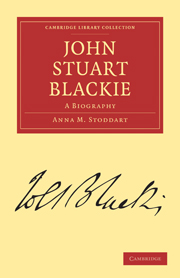Book contents
- Frontmatter
- PREFACE TO THE FIRST EDITION
- Contents
- CHAPTER I PARENTAGE AND CHILDHOOD. 1809–1819
- CHAPTER II AT SCHOOL AND COLLEGE. 1820–1829
- CHAPTER III STUDENT LIFE IN GÖTTINGEN. 1829
- CHAPTER IV STUDENT LIFE IN BERLIN. 1829–1830
- CHAPTER V ROME. 1830–1831
- CHAPTER VI END OF WANDERJAHRE. 1831–1832
- CHAPTER VII YEARS OF STRUGGLE. 1832–1837
- CHAPTER VIII THE TEST ACTS. 1837–1840
- CHAPTER IX INSTALLATION AND MARRIAGE. 1841–1842
- CHAPTER X ABERDEEN AND UNIVERSITY REFORM. 1842–1850
- CHAPTER XI ‘ÆSCHYLUS’ AND THE GREEK CHAIR. 1850–1852
- CHAPTER XII EDINBURGH. 1852–1857
- CHAPTER XIII LAYS, LECTURES, AND LYRICS. 1857–1860
- CHAPTER XIV HOMER. 1861–1866
- CHAPTER XV THE HIGHLANDS AND ISLANDS. 1866–1870
- CHAPTER XVI PILGRIM YEARS. 1870–1872
- CHAPTER XVII ‘SELF-CULTURE.’ 1873–1874
- CHAPTER XVIII THE CELTIC CHAIR. 1875–1876
- CHAPTER XIX EGYPT. 1876–1879
- CHAPTER XX RETIREMENT FROM THE GREEK CHAIR. 1880–1882
- CHAPTER XXI CLASS-ROOM AND PLATFORM. 1841–1882
- CHAPTER XXII RECREATIONS OF AN EMERITUS PROFESSOR. 1882–1887
- CHAPTER XXIII “LIVING GREEK.” 1888–1891
- CHAPTER XXIV CLOSING YEARS. 1892–1895
- INDEX
CHAPTER XVIII - THE CELTIC CHAIR. 1875–1876
Published online by Cambridge University Press: 05 October 2010
- Frontmatter
- PREFACE TO THE FIRST EDITION
- Contents
- CHAPTER I PARENTAGE AND CHILDHOOD. 1809–1819
- CHAPTER II AT SCHOOL AND COLLEGE. 1820–1829
- CHAPTER III STUDENT LIFE IN GÖTTINGEN. 1829
- CHAPTER IV STUDENT LIFE IN BERLIN. 1829–1830
- CHAPTER V ROME. 1830–1831
- CHAPTER VI END OF WANDERJAHRE. 1831–1832
- CHAPTER VII YEARS OF STRUGGLE. 1832–1837
- CHAPTER VIII THE TEST ACTS. 1837–1840
- CHAPTER IX INSTALLATION AND MARRIAGE. 1841–1842
- CHAPTER X ABERDEEN AND UNIVERSITY REFORM. 1842–1850
- CHAPTER XI ‘ÆSCHYLUS’ AND THE GREEK CHAIR. 1850–1852
- CHAPTER XII EDINBURGH. 1852–1857
- CHAPTER XIII LAYS, LECTURES, AND LYRICS. 1857–1860
- CHAPTER XIV HOMER. 1861–1866
- CHAPTER XV THE HIGHLANDS AND ISLANDS. 1866–1870
- CHAPTER XVI PILGRIM YEARS. 1870–1872
- CHAPTER XVII ‘SELF-CULTURE.’ 1873–1874
- CHAPTER XVIII THE CELTIC CHAIR. 1875–1876
- CHAPTER XIX EGYPT. 1876–1879
- CHAPTER XX RETIREMENT FROM THE GREEK CHAIR. 1880–1882
- CHAPTER XXI CLASS-ROOM AND PLATFORM. 1841–1882
- CHAPTER XXII RECREATIONS OF AN EMERITUS PROFESSOR. 1882–1887
- CHAPTER XXIII “LIVING GREEK.” 1888–1891
- CHAPTER XXIV CLOSING YEARS. 1892–1895
- INDEX
Summary
The record of this movement from start to finish forms the main source for Professor Blackie's biography during the ensuing four years.
The matter had been relegated to the University Council as soon as he seriously undertook its promotion. A committee was formed, which included representatives of the Edinburgh University, of the Highlands, of Celtic scholarship, and of the Free Church. Sir Alexander Grant, Professor Masson, Cluny Macpherson, Mr Alexander Nicolson, Lord Neaves, and Professor Macgregor were its members. Professor Blackie was member and convener, as well as executor of its behests. Papers indicating the circumstances which made the preservation of Celtic dialects urgent, and fitted with blank pages for subscription-lists, were prepared and forwarded to all parts of the kingdom, as well as to all provinces and colonies of the empire where Highlanders were resident. These were accompanied by the Professor's personal appeal,—on behalf of the maintenance of Gaelic in the Highlands for the people; of the Celtic dialects in the University for the needs of philological study.
The schools consequent upon the new educational policy were—in all parts of the Highlands—sapping the very foundations of their language. Manned by Englishspeaking teachers, they condemned the children who did not understand English to sit side by side with those who did, to read the same lessons, and to profit by them as best they could. To little girls and boys who painfully learned to utter sounds which conveyed no meaning to them, the hours at school were an unredeemed penance. The teacher had no means of relieving their futility, for a knowledge of Gaelic was not a necessary qualification for his post.
- Type
- Chapter
- Information
- John Stuart BlackieA Biography, pp. 299 - 320Publisher: Cambridge University PressPrint publication year: 2010First published in: 1896



